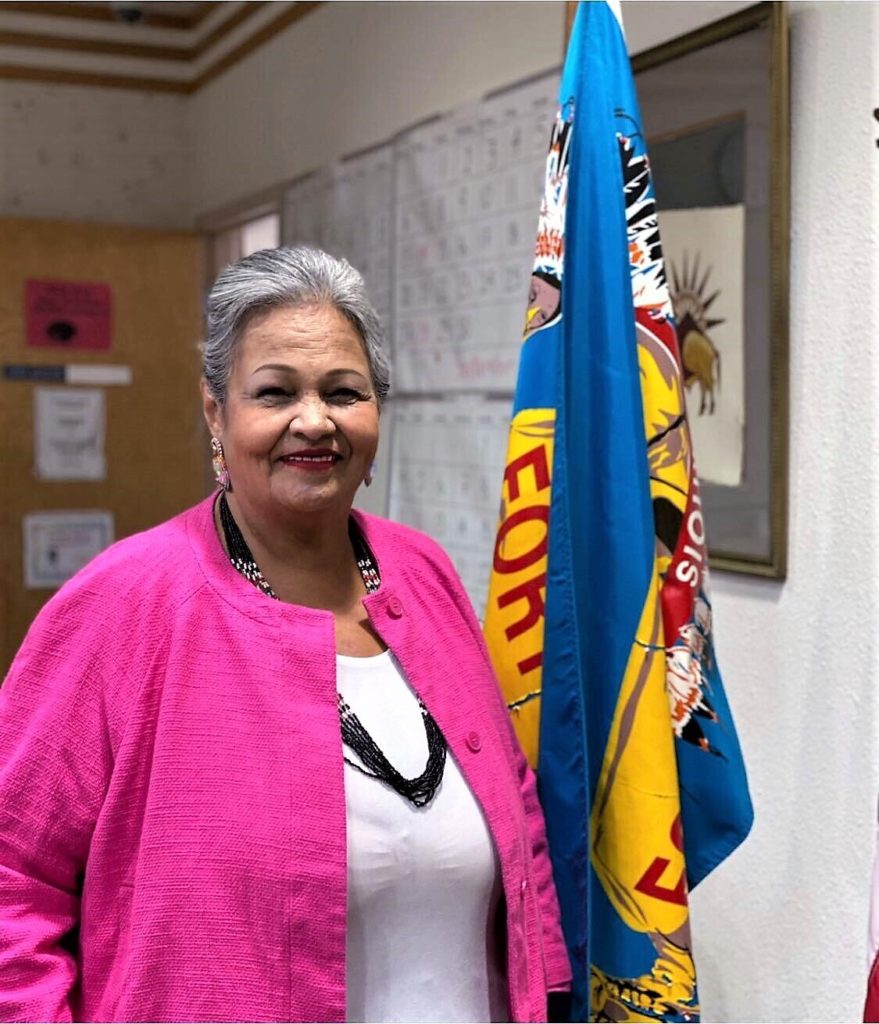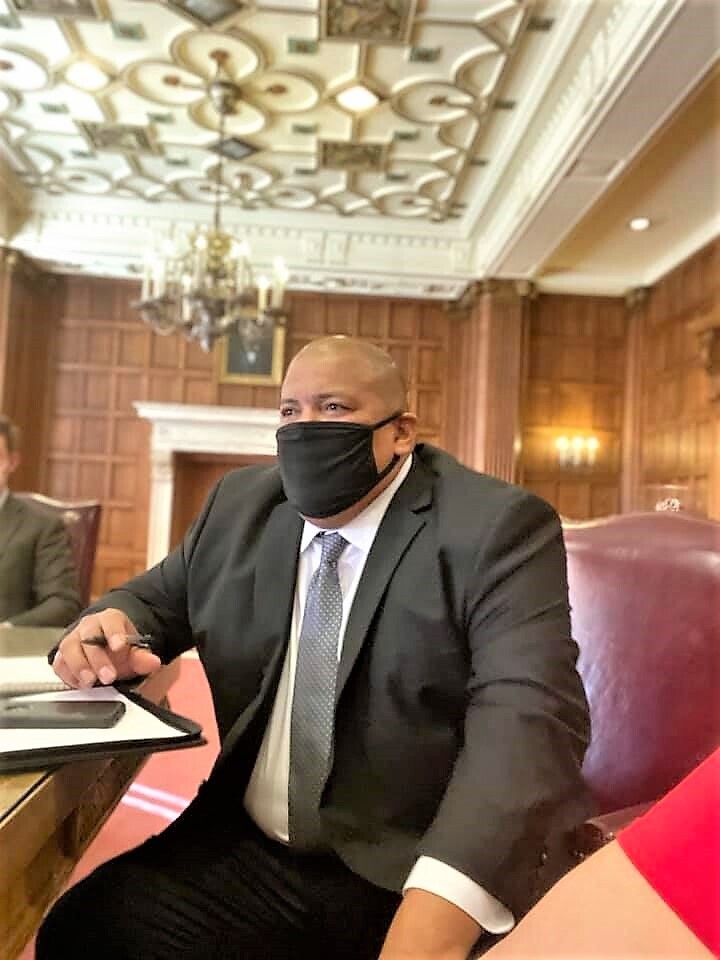Montana could join states with laws targeting pipeline opponents
Christian Hustad
Buffalo's Fire

Ft. Peck Sioux and Assiniboine Tribal Council Member Jestin Dupree testified that HB 481 “only seeks to beat Montana citizens into submission so that multinational corporations can pillage our lands and pollute our waters.”
HELENA, MONT—Montana may join 14 other states that have laws targeting pipeline opponents, if Rep. Steve Gunderson’s House Bill 481 obtains Senate approval. The bill passed in the lower chamber of the state Legislature after he assured the Judiciary Committee that similar legislation has successfully passed in North Dakota and Texas.
Hearings for the bill drew the attention of Native opponents due to its enhanced penalties for vandalism and destruction of critical infrastructure. Critics say the bill goes too far by criminalizing infractions and can have dire consequences for peaceful protesters.
Ft. Peck Sioux and Assiniboine Tribal Council Member Jestin Dupree testified that HB 481 “only seeks to beat Montana citizens into submission so that multinational corporations can pillage our lands and pollute our waters. It violates the 8th Amendment of the U.S. Constitution and Article 2 of the Montana Constitution,” he said.
However, the bill received a “Do Pass” with a 65-34 vote in its third and final reading on March 2 and was transmitted to the Senate for approval.
HB 481 “only seeks to beat Montana citizens into submission so that multinational corporations can pillage our lands and pollute our waters. It violates the 8th Amendment of the U.S. Constitution and Article 2 of the Montana Constitution.”
– Ft. Peck Sioux and Assiniboine Tribal Council Member Jestin Dupree
The legislation establishes a three-tier punishment system. It prescribes a fine of no more than $1,500, up to six months in prison or both for knowingly trespassing on property containing critical infrastructure without permission of the infrastructure’s owner.
It levies a fine of up to $4,500 with a possible 18-month imprisonment for trespassing “with intent to damage or destroy.” Finally, it calls for a charge of $150,000 or 30 years’ imprisonment for carrying out vandalism or destruction of the infrastructure.
Councilman Dupree and Councilwoman Patricia Iron Cloud Runs Through, also from the Ft. Peck Sioux and Assiniboine Tribal Council, both testified in opposition to the bill.
Runs Through recalled how she demonstrated against the Keystone XL project. Under the proposed legislation, she would have incurred costly charges, she said. Appearing remotely via Zoom live video, Runs Through focused her testimony on people’s right to express themselves.
Rep. Barry Usher dismissed her viewpoint and attempted to convince the committee that freedom of speech wasn’t the target of the bill.

“I believe he dismissed it because he didn’t see that even with the best of intentions, that I could possibly go to prison and have a large $150,000 fine levied against me during my peaceful protest,” Runs Through told Buffalo’s Fire, “That’s how broad that HB 481 is written. I pray that it dies!”
Dupree expressed concern that the penalties for these acts are already in place elsewhere in the Montana Code.
“I believe he dismissed it because he didn’t see that even with the best of intentions, that I could possibly go to prison and have a large $150,000 fine levied against me during my peaceful protest. That’s how broad that HB 481 is written. I pray that it dies!”
– Councilwoman Patricia Iron Cloud Runs Through from the Ft. Peck Sioux and Assiniboine Tribal Council
In addition to the punishment of individuals, this legislation would target organizations that “conspire to damage or vandalize critical infrastructure.” If a group is involved with a convicted person, it would be fined 10 times the amount of the fine that the person involved receives.
The legislation follows a model created by the American Legislative Exchange Council that was written in 2017. As a response to a yearlong standoff between pipeline fighters and militarized police over the Dakota Access Pipeline at Standing Rock, versions have passed in 14 other states, including Minnesota, Ohio, and South Dakota, according to documented.net. Forty states have at least broached similar legislation.
Although all states differ in how they write their respective bills, the goal is the same: to single out and penalize those who trespass on “critical infrastructure facilities,” which include pipeline construction sites.
Some states are seeing the results of the new infrastructure laws. In Louisiana, Anne White Hat, a member of the Sicangu Lakota Oyate, has been battling the Bayou Bridge Pipeline and was arrested for trespassing on critical infrastructure. With Louisiana’s Revised Statute 14:61, she faces two felony charges, which may result in 10 years in prison.
“We are not opposed to free speech, but we are opposed to vandalizing equipment.”
– Allan Olson, the executive director of the Montana Petroleum Association
Other states have taken a step further, like in South Dakota where Gov. Kristi Noem proposed and signed legislation to quell “riot boosting,” as she dubbed civil disobedience. A federal judge struck down much of its language, ruling in favor of leaders from the South Dakota tribes who argued that Natives were unfairly targeted because of the broad terms approved.

Proponents of Montana’s HB 481 recounted stories of individuals who vandalized facility equipment and asked the committee to pass the bill in order to discourage similar acts in the future. “We are not opposed to free speech, but we are opposed to vandalizing equipment,” said Allan Olson, the executive director of the Montana Petroleum Association.
Christian Hustad is an Assiniboine tribal citizen and content creator. Contact him at jhustad.94@gmail.com.
External
The tree features names of missing Indigenous people
Inspired by her grandparents, Tonah Fishinghawk-Chavez proves that caring for the community is an action, not just a word
The billboard project is expanding to Oregon
Identification not yet made
UTTC International Powwow attendees share their rules for a fun and considerate event






